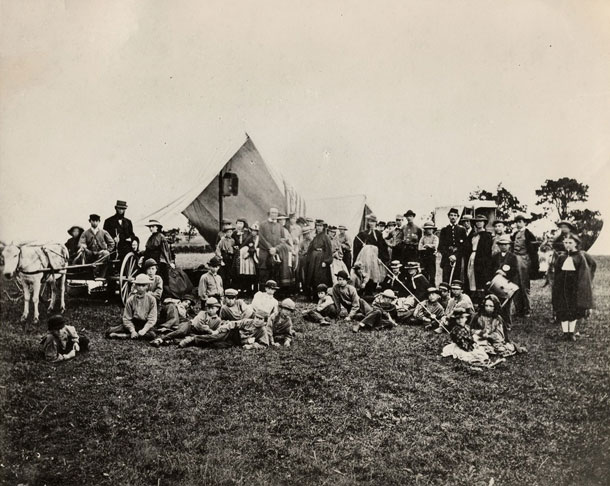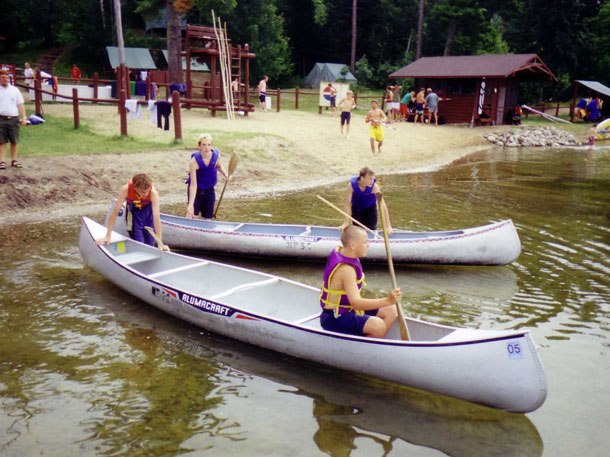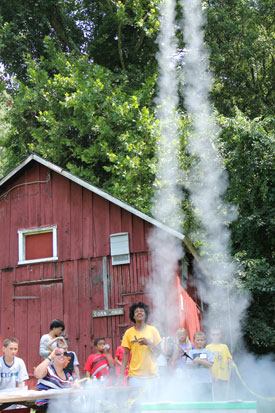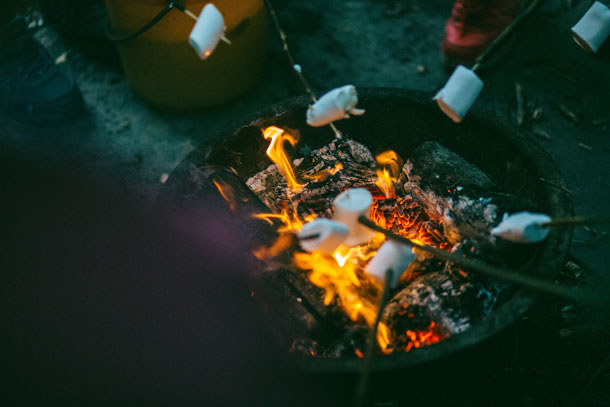The Value of Summer Camp
Air Date: Week of July 26, 2019

Gunnery Camp, considered to be the first organized American summer camp. (Photo: Wikimedia Commons, Public Domain)
Summer camp for youngsters began in the late 1800s as an escape from urban industrialization. Nowadays traditional summer camps offer a respite from technology and an opportunity to use nature as a classroom. Tom Rosenberg of the American Camp Association talks with Host Bobby Bascomb about the importance of camp in the digital age.
Transcript
BASCOMB: It’s Living on Earth, I’m Bobby Bascomb. Summer camp is a longstanding tradition in the United States. It’s a way for kids to take a break from academics and connect with nature. Today, there are thousands of camps across the United States, from day camps to specialty sleep-away camps. Activities range from the traditional canoeing and archery to building robots or painting birds. Here to tell us more about summer camp and the role it plays in the lives of children is Tom Rosenberg, President and CEO of the American Camp Association. Tom, welcome to Living on Earth!
ROSENBERG: Thanks, Bobby! It's a thrill to be with you.
BASCOMB: So, summer camp in the United States has a pretty long history, from what I understand. Can you tell me a little bit about that? When did summer camp get started here?
ROSENBERG: Camp really has been around for probably over 150 years. The early camp directors were, in fact, teachers who were bringing their young people, their students out to the woods to escape urban industrialization and distraction, and bring them to a healthier environment in which to focus and learn, using nature as a classroom. Many of America's camps are over 100 years old, but there are camps for children with medical disorders, there are camps for children of a particular culture or faith. There are also camps that are very diverse and secular and focused on a particular activity, for example, like kayaking, or rock climbing or, or academics for that matter.

Summer campers launching canoes. (Photo: Steve B, Flickr, CC BY-NC 2.0)
BASCOMB: Yeah, it seems there's a rise in recent years in more specialized camps like computer camp or soccer camp, band camp, engineering camp, I mean, you name it, it seems there's a camp for that. What do you see as the benefit of those camps as compared to a more traditional, you know, canoeing type camp?
ROSENBERG: You know, I have visited camps that are based in nature, and that are teaching science and engineering and robots and physics, actually at an outdoor summer camp. I think parents today are looking for their children to learn new skills in an environment that has a little bit of that traditional piece there. So it has exposure to nature, that also offers them that community experience where they're learning to live and work and play and appreciate nature in a group setting. So they're learning to build relationship skills, learning to be more independent away from mom and dad, but also learning to be responsible for the group and for nature, and some stewardship skills.
BASCOMB: Tell me about family camps, those are camps that the whole family can attend together.
ROSENBERG: Absolutely. Family camp is not a new concept. But it's a growing concept where overnight camps have accommodations for the whole family to go. So, when I was a camp director, we would have sometimes three generations of a family come and experience overnight camp together for solid a week sometimes. And at family camp, kids can be engaged in programming that is appropriate for kids, teens can be engaged in teen programming, adults can do adult level positive risk opportunities. And, so, at different times of the day, the whole family's together doing activity. Some family camps, you can even decide which meals to enjoy camp-style with your counselors and which meals to enjoy with your parents. So, it's a great way for everyone to get in the fun, everyone to experience nature.

Campers launch rockets at a math and science specialty camp. (Photo: CERDEC, Flickr, CC BY-NC 2.0)
BASCOMB: What role do you think camp plays in childhood development more generally? I mean, why send your kid away to camp to learn how to canoe and get devoured by mosquitoes?
ROSENBERG: [LAUGHS] Well, I would tell you that today camp is a more essential educational experience for children, teens, and young adults than ever before. There are studies that are pointing to this generation of post millennials being very digital. And, they're developing the majority of their relationships digitally, and they're communicating primarily in a digital fashion. So, where is this generation learning in-person social skills? Where are they learning intuition and empathy for each other? We need to make sure that our children have a grounded education in social and emotional learning. And, tied to that we need to take advantage of nature's classroom, because kids have the opportunity at camp to have distraction-free learning. I think you probably know that kids today with ADHD, for example, are better able to concentrate after being in nature. And so camp is very therapeutic. We know that from scientific studies that exposure to natural environments improves a child's cognitive abilities by improving their awareness, their reasoning and their observational skills. I also think that kids today are over scheduled, and perhaps overstressed. Kids are showing up at camp today with a considerable amount of trauma from different sources back at home, not necessarily in their home, but just trauma. And so camp is therapeutic. Nature is therapeutic.
BASCOMB: And, what about just creating a relationship with nature?
ROSENBERG: Absolutely. It's so important, Bobby, to give children an opportunity to create their own personal relationship with nature, to develop an understanding of what it means to be an environmental steward, to take responsibility for our world and to understand the cause and effect relationship between humans and nature. All American children, regardless of whether they've been to camp before or not, need to have these kinds of experiences outside so that they can develop an appreciation for our natural resources.
BASCOMB: Talk to me a bit, please, about the socioeconomic breakdown of campers today. What does the average camper look like? And, how are you trying to make that more available to everyone?
ROSENBERG: The average cost of a week-long day camp ranges from $100 to over $500 for a week; the cost of an overnight experience, that price can vary from under $200 for a highly subsidized camp to over $1500 a week in a very expensive setting. 93% of American Camp Association accredited camps offer some form of scholarship. But it does take a good bit of work on a parent's part to find a camp that offers the resources or resources that help them get to the camp of their choice. We are trying to make camp more accessible. I'd say today in American Camp Association accredited camps, over 30% of campers and seasonal staff are from a diverse background, but we're working every day to make more parents aware of camp and the benefits it offers their children, as well as ways to make it a more equitable experience for all.

Marshmallows roasting over a campfire (Photo: Josh Cambell, Unsplash, Public Domain)
BASCOMB: Do you yourself have any favorite camp experience that you look back on fondly - well, that was the moment that I decided I was gonna, you know, dedicate my life to camp.
ROSENBERG: I had many wonderful experiences as a camper in camp. But probably my most favorite memorable experience out in nature was I had the opportunity to spend my summer leading first-time backpacking trips for boys and girls into the Appalachian Mountains. And, there is nothing like showing the wonder and rigor and challenge of backpacking to, you know, tweens who are doing it for the first time. There's nothing like that. That experience really reinforced for me why I wanted to lead camps, so that I could help generations of kids embrace nature and embrace community and embrace learning outside. Camp is such an inspiring experience in different ways for different people. So, it has been and always will be that place that I go to, to become re-centered. To be more mindful, take a deep breath and think about how I think about what inspires me about today and tomorrow.
BASCOMB: Tom Rosenberg is the President and CEO of the American Camp Association. Tom, thanks so much for taking this time with me.
ROSENBERG: Thanks for having me, Bobby. I've really enjoyed this.
Links
Living on Earth wants to hear from you!
Living on Earth
62 Calef Highway, Suite 212
Lee, NH 03861
Telephone: 617-287-4121
E-mail: comments@loe.org
Newsletter [Click here]
Donate to Living on Earth!
Living on Earth is an independent media program and relies entirely on contributions from listeners and institutions supporting public service. Please donate now to preserve an independent environmental voice.
NewsletterLiving on Earth offers a weekly delivery of the show's rundown to your mailbox. Sign up for our newsletter today!
 Sailors For The Sea: Be the change you want to sea.
Sailors For The Sea: Be the change you want to sea.
 The Grantham Foundation for the Protection of the Environment: Committed to protecting and improving the health of the global environment.
The Grantham Foundation for the Protection of the Environment: Committed to protecting and improving the health of the global environment.
 Contribute to Living on Earth and receive, as our gift to you, an archival print of one of Mark Seth Lender's extraordinary wildlife photographs. Follow the link to see Mark's current collection of photographs.
Contribute to Living on Earth and receive, as our gift to you, an archival print of one of Mark Seth Lender's extraordinary wildlife photographs. Follow the link to see Mark's current collection of photographs.
 Buy a signed copy of Mark Seth Lender's book Smeagull the Seagull & support Living on Earth
Buy a signed copy of Mark Seth Lender's book Smeagull the Seagull & support Living on Earth

